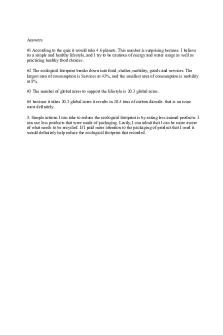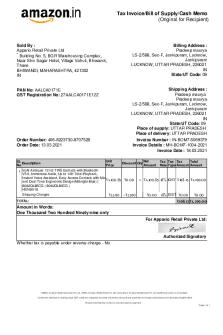The World System, Globalization, Ecological Anthro PDF

| Title | The World System, Globalization, Ecological Anthro |
|---|---|
| Author | Chandler Girman |
| Course | Introduction To Anthropology |
| Institution | Virginia Commonwealth University |
| Pages | 3 |
| File Size | 72.4 KB |
| File Type | |
| Total Downloads | 33 |
| Total Views | 149 |
Summary
Dr. Rector-Verelli...
Description
●
●
● ●
●
●
●
Effects of Colonialism: ○ Postcolonial studies: analysis of interactions between European nations and societies they colonized ○ Entire countries and social groups were colonial inventions ○ Modern political boundaries based on linguistic, political contrasts resulting from European colonial policies The “Second World”: Former Soviet Union nations and the socialist and once-socialist, countries of Eastern Europe and Asia ○ Often associated with communism communism (small c): social system in which property is owned by the community and in which people work for the common good Communism (large C): a political movement and doctrine seeking to overthrow capitalism and establish a form of communism ○ Currently five Communist states compared with 23 in 1985 ■ China ■ Cuba ■ Laos ■ North Korea ■ Vietnam ○ Communist party monopolizes power ■ States own means of productions ■ Regimes cultivated a sense of belonging to an international movement World System today: ○ Industrialization of the 20th century added hundreds of new industries and millions of new jobs ■ Mass production gave rise to a culture of consumption ■ Industrialization entailed a shift from renewable resources to the use of fossil fuels ○ Industrial Degradation: ■ Industrialization, factory labor characteristic ● Destruction of indigenous economies, ecologies, and indigenous people Climate Change: ○ Precise local effects undetermined ○ Energy needs ○ Arctic landscapes and ecosystems changing rapidly and perceptibly ○ Coastal communities have increased flooding and severe storms ○ Human influence: use of fossil fuels and consumerism ○ Accelerate migration, destabilize communities, exacerbate spread of infectious diseases ○ Most affected peoples will live on the environmental periphery ○ Anthropologists can play a role Ecological Anthropology: the study of cultural adaptations to environments ○ Ethnoecology: society’s set of environmental practices and perceptions
○
●
●
●
●
●
Indigenous ethnoecologies increasingly challenged by migration, media, and commerce ○ Global vs. Local: ■ Clash of cultures occurs when development threatens indigenous people and their environments ■ Second clash occurs when external regulation aimed at conservation confronts indigenous people ■ “Preserving biodiversity”? ■ Applied ecological anthropology must devise culturally appropriate strategies ○ Deforestation: forest loss can lead to increased greenhouse gas production and loss of global biodiversity ■ Modern strategies more likely to consider needs of people living in and near forests ■ Government-conservation policies may require people to change past practices ■ Reasons to change their behavior must make sense to local people Emerging diseases: ○ Disease spread driven by population increase, changing settlement patterns, commercial expansion, climate change ○ Disease vectors and diseases: ■ Infections to and from humans Risk Assessment: ○ risk perception may be more developed in groups that are less endangered objectively ■ Mass media hone risk perception ○ Once people perceive risks, they need incentives to take action Interethnic Conflict: ○ Changes that arise from contacts between industrial and nonindustrial societies ■ Acculturation: changes in the cultural patterns of either or both groups ■ Westernization: the influence of western expansion on indigenous peoples ● Destruction, domination, resistance, survival, adaptation, and modification of native cultures Religious Change: ○ Proselytizing can promote ethnocide as Western beliefs and practices replace native ones Cultural Imperialism: ○ Spread or advance of one culture at the expense of others ■ Modern technology erasing cultural differences? ■ Modern technology providing opportunity for local cultures to express themselves? ■ When forces form world centers enter new societies, the societies become indigenized: modified to fit the local culture
●
●
●
Global Consumption: ○ Global culture driven by flows of people, technology, financial, data, ideology ○ Business, technology, and media have increased people’s craving for commodities and images throughout the world ○ Mass media present a rich, ever-changing store of possible lives People in Motion: ○ Linkages in modern world system have enlarged, erased old boundaries, distinctions ■ Scale of movement has expanded dramatically ■ Diaspora: the offspring of a given area who have spread to many loads ○ Postmodernity: describes our time and situation, with today’s world in flux ○ Postmodern: period of blurring and breakdown of established categories, distinctions, boundaries Indigenous peoples: ○ United Nations Working Group on Indigenous People (WGIP) formed in 1982 ■ Social movements adopted the term indigenous people as a selfidentifying, political label ■ Based on past oppression ■ Legitimizing the search for social, cultural, and political rights...
Similar Free PDFs

Rodrik The Globalization Paradox
- 171 Pages

Globalization
- 2 Pages

Ball World and the world
- 4 Pages

Ecological footprint
- 1 Pages

Anthro Midterm
- 10 Pages

Anthro 105
- 7 Pages

Ecological Succession
- 4 Pages
Popular Institutions
- Tinajero National High School - Annex
- Politeknik Caltex Riau
- Yokohama City University
- SGT University
- University of Al-Qadisiyah
- Divine Word College of Vigan
- Techniek College Rotterdam
- Universidade de Santiago
- Universiti Teknologi MARA Cawangan Johor Kampus Pasir Gudang
- Poltekkes Kemenkes Yogyakarta
- Baguio City National High School
- Colegio san marcos
- preparatoria uno
- Centro de Bachillerato Tecnológico Industrial y de Servicios No. 107
- Dalian Maritime University
- Quang Trung Secondary School
- Colegio Tecnológico en Informática
- Corporación Regional de Educación Superior
- Grupo CEDVA
- Dar Al Uloom University
- Centro de Estudios Preuniversitarios de la Universidad Nacional de Ingeniería
- 上智大学
- Aakash International School, Nuna Majara
- San Felipe Neri Catholic School
- Kang Chiao International School - New Taipei City
- Misamis Occidental National High School
- Institución Educativa Escuela Normal Juan Ladrilleros
- Kolehiyo ng Pantukan
- Batanes State College
- Instituto Continental
- Sekolah Menengah Kejuruan Kesehatan Kaltara (Tarakan)
- Colegio de La Inmaculada Concepcion - Cebu








